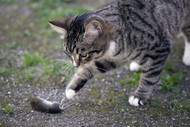Why do cats bring animals as gifts?
25th Jan 2024
If you have an outdoor cat, more likely than not, at some time or another, you will have been presented with their fresh kill. Or perhaps even worse, they have released a maimed creature into your home for you to catch! But why do our beloved pets bring us these unwanted gifts? And how can we stop them from bringing small rodents and birds into our homes?
Cats are natural predators, and this is deeply ingrained in their DNA. Even well-loved and well-fed cats have the instinct to hunt. In the wild, they would go out hunting and then bring their prey back to their territory where they feel safe. Whilst it is flattering that they feel safe in our homes and consider themselves one of the family, it can be rather unpleasant for us!
Cats do not just hunt to feed themselves; they also use the opportunity to train their kittens. This is why they often bring back live creatures; this is especially true of female cats. Cats maintain this instinct even when they do not have kittens of their own. Some cat behaviourists hypothesise that when cats bring back live prey to us, they are teaching their humans how to hunt. They are probably very disappointed with us when we don’t pounce, claws first, at the mouse they present to us and are then somewhat bemused as to why we are screaming and allowing it to dart under the sofa!
If you cat does bring in a live animal, shut your cat in another room. Leave open the doors to outside, in the room that the animal is in. They will soon find their way out if they are left in peace. You could also use a humane trap to catch the animal and then release it. Keep your cat in for as long as possible to give the animal a fighting chance of escape.
As humans, we do not appreciate these kinds of gifts. In addition to this, it is damaging to the native wildlife species. The RSPB estimates that UK cats catch up to one hundred million creatures each year, including twenty-seven million birds. For these reasons it is important to do what we can to try and limit our cat’s victims.
Ideas to try include:
- Scheduling outdoor time:
By limiting your cat’s time spent outside to times of the day with less wildlife activity, there will be fewer hunting opportunities. Small animals are usually more active overnight, and birds in the mornings, so try to keep your cat inside between dusk and mid-morning.
- Bell collars:
Collars can be purchased with bells attached, or you could attach a bell to an existing collar. Hopefully the noise of the bell will warn any unsuspecting prey before your cat has time to pounce. Always make sure that you use a collar designed for cats that has a quick release clasp so your cat cannot become caught on anything.
- Play with them:
Keep your cat active with play to burn off all that excess energy. Use wand toys so that they can use their hunting instincts without doing any harm.
- Bird feeder positioning:
Think sensibly about where you put your bird feeders if you have any. If you have a particularly prey-motivated cat it might be wise not to have a bird feeder in the vicinity. If you must have one in your garden, try and position it in an area out of sight of your cat. Where possible, accompany them when they are in your garden so that you can watch out for their signals that they are on the prowl for prey.
Whereas we want our cats to have a good time and be able to practice their natural prey instincts, it is important to also protect other mammals and birds, particularly if the cat is catching them for enjoyment, rather than as a food source. Moreover, I’m sure we would all agree that keeping live or dead cat ‘gifts’ out of our homes is preferable!
